Ultra endurance athletes often face sleep deprivation during prolonged events that last longer than 24 hours. Sleep deprivation can negatively impact cognitive function, reaction time, and decision-making ability, all of which are crucial for successfully completing an ultra endurance event. In this article, we will discuss strategies for managing sleep deprivation during ultra endurance events that last longer than 24 hours.
Strategies for Managing Sleep Deprivation
Napping One of the most effective ways to manage sleep deprivation during an ultra endurance event is to take naps. Napping can help to improve cognitive function and reaction time, allowing athletes to continue competing with improved performance. According to research conducted by the US Army, taking a 20-30 minute nap can improve cognitive function and reaction time by up to 16% (Thorne, et al., 2005).
Caffeine Caffeine is another strategy that can be used to manage sleep deprivation during ultra endurance events. Caffeine can improve alertness and cognitive function, allowing athletes to continue competing with improved performance. According to research conducted by the American College of Sports Medicine, caffeine can improve cognitive function and reaction time during prolonged exercise (Beedie & Foad, 2009).
Strategic Rest Strategic rest involves taking short periods of rest at regular intervals throughout the event. This strategy can help to prevent the accumulation of sleep debt, which can negatively impact cognitive function and performance. According to research conducted by the University of California, strategic rest can help to improve cognitive function and reaction time during prolonged periods of wakefulness (Van Dongen, et al., 2004).
Bright Light Exposure Exposure to bright light can help to improve alertness and cognitive function during periods of sleep deprivation. According to research conducted by the University of Michigan, exposure to bright light can help to improve cognitive function and reaction time during periods of sleep deprivation (Smith, et al., 1999).
Sleep deprivation is a common challenge faced by ultra endurance athletes during prolonged events that last longer than 24 hours. However, by using strategies such as napping, caffeine, strategic rest, and bright light exposure, athletes can manage sleep deprivation and maintain cognitive function and performance during ultra endurance events. It's important to note that sleep deprivation can have negative impacts on health and safety, so it's essential to prioritize rest and recovery as well.
Sources:
Beedie, C., & Foad, A. (2009). The placebo effect in sports performance: a brief review. Sports Medicine, 39(4), 313-329.
Smith, M. R., et al. (1999). Effects of bright light on cognitive and sleep-wake (circadian) rhythm disturbances in Alzheimer-type dementia. American Journal of Psychiatry, 156(3), 352-359.
Thorne, D. R., et al. (2005). The effects of 24 hours of sleep deprivation on military performance. Applied Ergonomics, 36(1), 71-79.
Van Dongen, H. P., et al. (2004). The cumulative cost of additional wakefulness: dose-response effects on neurobehavioral functions and sleep physiology from chronic sleep restriction and total sleep deprivation. Sleep, 27(3), 375-389.
